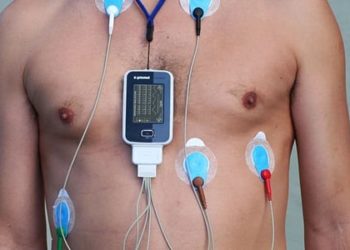Weakened grip strength associated with increased morbidity and mortality [PURE study]
1. Grip strength was inversely associated with all-cause mortality, cardiovascular mortality, non-cardiovascular mortality, myocardial infarction, and stroke.
2. Grip strength was a stronger predictor of all-cause mortality and cardiovascular mortality than systolic blood pressure.
Evidence Rating Level: 2 (Good)
Study Rundown: Simple, cost-effective risk stratification tools can help clinicians optimize patient management, particularly in areas in which more expensive testing is unrealistic. Several studies have associated a reduction in muscle strength, classically measured by grip strength, with mortality. While many of these studies assessed populations from high-income countries, the investigators in this study also included middle and low-income countries – thereby providing information about the usefulness of grip strength in the populations in which it may be most useful. The primary outcomes included time to all-cause mortality, cardiovascular mortality, non-cardiovascular mortality, myocardial infarction, stroke, incident diabetes, pneumonia, hospital admission for pneumonia or COPD, hospital admission for any respiratory disease, injury due to a fall, and fracture. Corroborating the findings of previous studies, the investigators found a reduction in grip strength was associated with an increased risk of all-cause mortality, cardiovascular mortality, non-cardiovascular mortality, myocardial infarction, and stroke. No significant association was found between grip strength and risk for diabetes, pneumonia, COPD, or fall and fracture. This study raises important questions about the role and perhaps great value of dynamometers in a doctor’s office.
Click to read the study, published today in The Lancet
Relevant Reading: Grip strength, body composition, and mortality
In-Depth [prospective cohort]: This study investigated the association between mortality, specific morbidities, and grip strength. 139,691 patients from 17 countries were included into the study. Jamar dynamometers were used to measure grip strengths. Grip strength was measured 3 times in both hands of each subject. Only the maximum scores were used in the statistical analysis. Baseline characteristics (self-reported demographics, cardiovascular risk factors, comorbid disorders, education levels, employment status, physical activity levels, tobacco/alcohol use, and dietary patterns) of subjects were gathered using a standardized questionnaire. Blood pressure, anthropometrics, and information about the subjects’ physical activity level and diet were also collected.
Age and height adjusted grip strength values varied based on income; grip strength was 30.2 kg (SD 8.20) in low-income countries, 37.3 kg (SD 8.19) in middle-income countries, and 38.1 kg (SD 8.98) in high-income countries. Grip strength was inversely associated with all-cause mortality (hazard ratio per 5 kg reduction in grip strength, same below, 1.16, 95% CI 1.13–1.20; p<0.0001). It was also inversely associated with the following outcomes: cardiovascular mortality (1.17, 1.11–1.24; p<0.0001), non-cardiovascular mortality (1.17, 1.12–1.21; p<0.0001), myocardial infarction (1.07, 1.02–1.11; p=0.002), and stroke (1.09, 1.05–1.15; p<0.0001). The inverse association between grip strength and death was consistent between sexes (interaction p=1.0) and age by tertile (interaction p=0.1). Grip strength was found to be a better predictor of all-cause mortality and cardiovascular death than systolic blood pressure.
Image: PD
©2015 2 Minute Medicine, Inc. All rights reserved. No works may be reproduced without expressed written consent from 2 Minute Medicine, Inc. Inquire about licensing here. No article should be construed as medical advice and is not intended as such by the authors or by 2 Minute Medicine, Inc.







